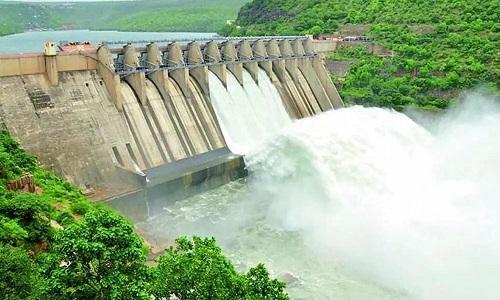
Utilisation of Krishna water for generation of hydel power at common reservoirs has remained a bone of contention between Andhra Pradesh and Telangana ever since bifurcation of the State in 2014. Even though the Centre and its agencies such as the Krishna River Management Board (KRMB) have categorically stated that power generation is incidental to irrigation and drinking water needs, a clarification that supports AP’s arguments, the issue continues to flare the tempers between the two States.
While Telangana has been maintaining that it is well within its rights to continue power generation, AP argues that neither the Krishna Water Disputes Tribunal-I nor the AP Reorganisation Act, 2014, supports the neighbouring State’s claims. AP officials agree that Srisailam reservoir was originally conceived as a hydroelectric project, an argument repeatedly made by their counterparts from Telangana.
However, needs and priorities changed over the decades since then and irrigation and drinking water requirements took precedence over power, they added. Andhra Pradesh’s arguments were also endorsed by the Ministry of Jal Shakti (MoJS) and the KRMB, but both have not been able to stop Telangana from utilising water for hydel power generation.
‘AP’s consent is a must’
AP argues that TS can’t “unilaterally” draw water exclusively for power generation without the former’s consent. The State officials recalled that initially a 770 MW (7×110 MW) conventional hydro power station was built between 1882 and 1987 on the right bank of the river in the erstwhile united AP to meet the peak load power and run of the river power generation/secondary power when Krishna is flooding during the monsoon.
Later, another hydro power station of 900 MW (6×150 MW) capacity on the left bank of the river was envisaged and built between 2001 and 2003 as a pumped storage hydropower (PSHP) station.
From the chronological order and the intended purpose of the above hydro power stations, AP has the first right to generate peaking power and run of the river/secondary (during floods) power, AP officials argued.
Post-bifurcation battle over water-sharing
They added that TS is only entitled to use the water for energy storage purpose and may also run of the river or secondary power during floods after the use by the 770 MW station of AP.
As the 770 MW capacity station located in AP is fully adequate to release water throughout the year to the downstream Nagarjuna Sagar reservoir, TS cannot claim equal rights similar to AP as its power station was built with the sole purpose of energy storage unlike the conventional peaking power station of the AP, they claimed.
“TS should confine use of its 900 MW PSHP station to energy storage purposes only except when excessive flood water is available after the use by the 770 MW power station of AP. All the water used for energy storage purposes by TS on daily/weekly/seasonal basis shall be pumped back to Srisailam reservoir,” a senior official from the State Water Resources Department explained.
Water wastage by TS a bone of contention
Even at Nagarjuna Sagar and Pulichintala power stations, TS can’t use water exclusively for power when there are no water requirements downstream, AP added. Power generation when there are no irrigation and drinking water requirements downstream of both the projects is “leading to inevitable wastage of water” from Prakasam Barrage into the sea, the AP officials observed.
“Especially when flood cushion is not available, inevitable water wastage would increase as the flood water generated in the catchment area between Nagarjuna Sagar and Pulichintala cannot be impounded. Clause VII of the KWDT final order clearly stipulates that water use in case of power generation shall be measured by the extent of depletion of water of the river in any manner whatsoever,” the officials said.
Since June 1 this year, TS has so far utilised 113.57 TMC from Srisailam, 86.6 TMC from Nagarjuna Sagar and 23.63 TMC from Pulichintala projects for power generation, excluding the quantum drawn during surplus period.
“Based on the above provisions, we have been urging the KRMB to account for the inevitable water wastage taking place with the exclusive hydro power generation by the TS as part of its allocation since it is not strictly releasing water as per the requirement of downstream AP,” another official explained.











